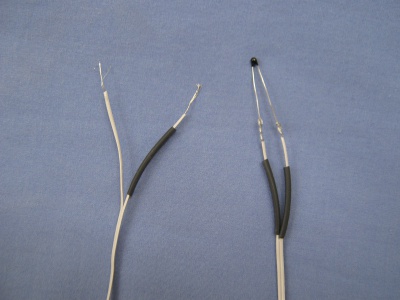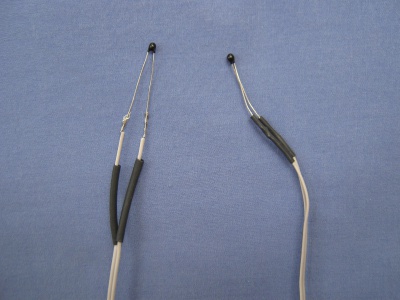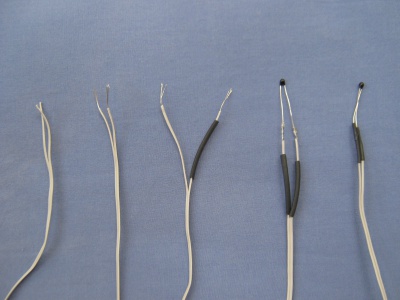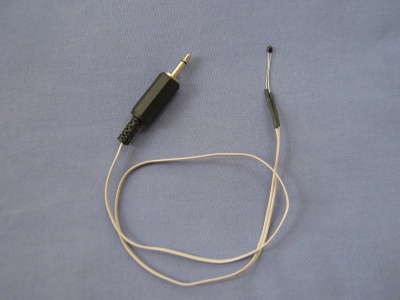Making XO sensors/Making a Thermistor: Difference between revisions
Jump to navigation
Jump to search
No edit summary |
Tonyforster (talk | contribs) No edit summary |
||
| (9 intermediate revisions by 5 users not shown) | |||
| Line 1: | Line 1: | ||
You need: |
|||
<div style="font-size: 1.0em;" align=center> |
|||
* a thermistor, |
|||
'''MAKING A THERMISTOR'''</div> |
|||
** The thermistor should have a resistance about [http://wiki.sugarlabs.org/go/Activities/TurtleArt/Using_Turtle_Art_Sensors#Resistance_Mode midrange in the XO's measurement range] at normal temperatures, for example the TDC05C247 which has a resistance of 4700 ohms at 25C will give a good range of measurement |
|||
<center> |
<center> |
||
[[Image: |
[[Image:Thermistor 01.jpg|400px]] |
||
</center> |
</center> |
||
As shown in the picture, tear the two ends of the wire apart and use a Stripper to strip the wire bare. |
::::::As shown in the picture, tear the two ends of the wire apart and use a Stripper to strip the wire bare. |
||
Slide on the X (heat-compressible rubber tubing) onto both ends of the wire as shown. Only one side is shown in the picture, but follow the same process for the other wire. |
::::::Slide on the X (heat-compressible rubber tubing) onto both ends of the wire as shown. Only one side is shown in the picture, but follow the same process for the other wire. |
||
<center> |
<center> |
||
[[Image: |
[[Image:Thermistor 02.jpg|400px]] |
||
</center> |
</center> |
||
Next, use the soldering iron to connect the two ends of the wire to the sensor. This can be done by adding some solder to the two wires emerging from the thermistor and to the bare ends of the wire. Subsequently, join the two together as shown in the picture, and allow the solder to cool, solidify and thus connect. |
::::::Next, use the soldering iron to connect the two ends of the wire to the sensor. This can be done by adding some solder to the two wires emerging from the thermistor and to the bare ends of the wire. Subsequently, join the two together as shown in the picture, and allow the solder to cool, solidify and thus connect. |
||
Next, slide the rubber tubing up the wire so that it completely covers the two contact points, and then use X (hot air) to compress the rubber tubing onto the wire. |
::::::Next, slide the rubber tubing up the wire so that it completely covers the two contact points, and then use X (hot air) to compress the rubber tubing onto the wire. |
||
<center> |
<center> |
||
[[Image: |
[[Image:Thermistor 03.jpg|400px]] |
||
</center> |
</center> |
||
| Line 27: | Line 30: | ||
<center> |
<center> |
||
[[Image: |
[[Image:Thermistor 04.jpg|400px]] |
||
</center> |
</center> |
||
<center> |
<center> |
||
'''A finished sensor that can record changes in temperature! |
'''A finished sensor that can record changes in temperature! |
||
'''</center> |
'''</center> |
||
For how to calibrate your sensor see http://wiki.sugarlabs.org/go/Activities/TurtleArt/Using_Turtle_Art_Sensors#Measuring_Temperature |
|||
== Other sensor instructions == |
|||
{{Special:PrefixIndex/Making_XO_sensors/}} |
|||
[[Category:XO sensors]] |
|||
Latest revision as of 07:14, 30 November 2012
You need:
- a thermistor,
- The thermistor should have a resistance about midrange in the XO's measurement range at normal temperatures, for example the TDC05C247 which has a resistance of 4700 ohms at 25C will give a good range of measurement
- As shown in the picture, tear the two ends of the wire apart and use a Stripper to strip the wire bare.
- Slide on the X (heat-compressible rubber tubing) onto both ends of the wire as shown. Only one side is shown in the picture, but follow the same process for the other wire.
- Next, use the soldering iron to connect the two ends of the wire to the sensor. This can be done by adding some solder to the two wires emerging from the thermistor and to the bare ends of the wire. Subsequently, join the two together as shown in the picture, and allow the solder to cool, solidify and thus connect.
- Next, slide the rubber tubing up the wire so that it completely covers the two contact points, and then use X (hot air) to compress the rubber tubing onto the wire.
Quick refresher of the different steps!
A finished sensor that can record changes in temperature!
For how to calibrate your sensor see http://wiki.sugarlabs.org/go/Activities/TurtleArt/Using_Turtle_Art_Sensors#Measuring_Temperature
Other sensor instructions
- Making XO sensors/Construir Sensor Luz
- Making XO sensors/How to connect sensors
- Making XO sensors/Lichtsensor
- Making XO sensors/Making a Humidity Sensor
- Making XO sensors/Making a Light Sensor
- Making XO sensors/Making a Magnetic Sensor
- Making XO sensors/Making a Switch Sensor
- Making XO sensors/Making a Temperature Sensor
- Making XO sensors/Making a Thermistor



